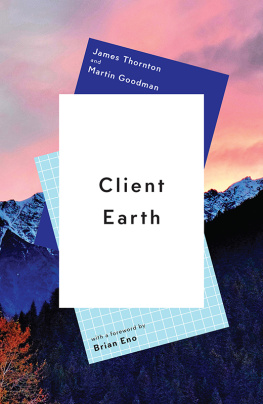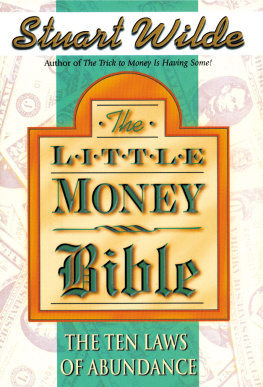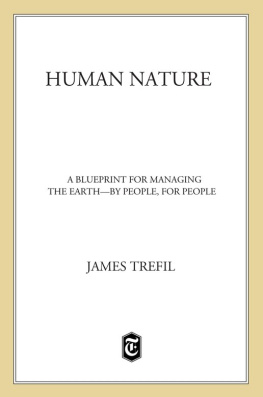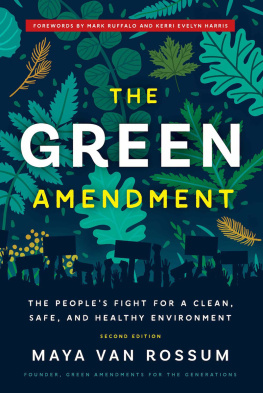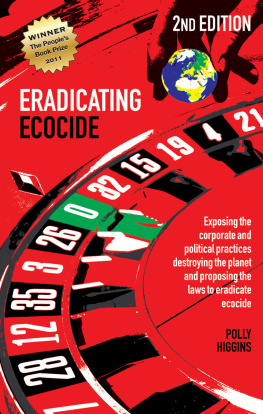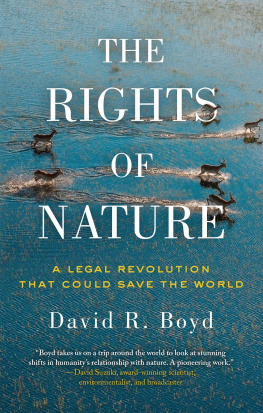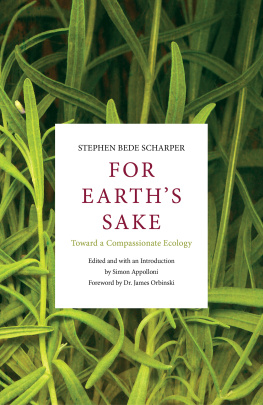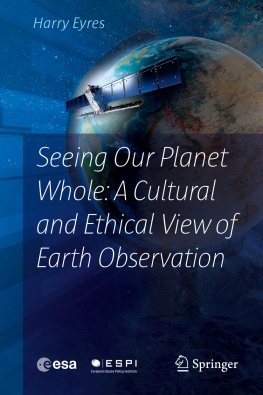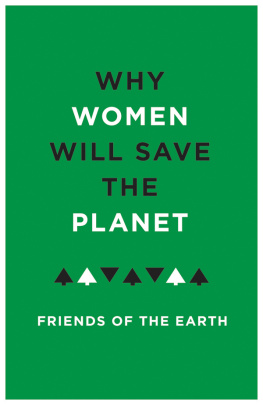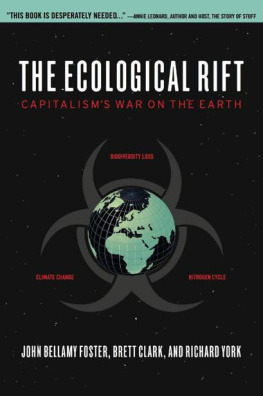
CLIENT EARTH
Martin Goodman is the author of nine books of fiction and nonfiction. His most recent book of nonfiction, Suffer & Survive , won First Prize, Basis of Medicine in the BMA Book Awards. He holds the chair of Creative Writing at the University of Hull, where he is director of the Philip Larkin Centre for Poetry and Creative Writing.
www.martingoodman.com @MartinGoodman2
James Thornton is founder and CEO of ClientEarth, the only pan-European group of environmental lawyers working in the public interest, throughout the EU and in Africa, China, and the US. He is a solicitor of England and Wales, and a member of the bar in New York, California, and the Supreme Court of the United States. The New Statesman named him as one of ten people who could change the world. He is also a Zen Buddhist priest, a naturalist, an author, a violinist, and a birdwatcher. He lives in London and the Languedoc, with Martin Goodman.
www.jamesthornton.co.uk @JamesThorntonCE
Scribe Publications
1820 Edward St, Brunswick, Victoria 3056, Australia
2 John Street, Clerkenwell, London, WC1N 2ES, United Kingdom
First published by Scribe 2017
Copyright Martin Goodman and James Thornton 2017
Foreword Brian Eno 2017
All rights reserved. Without limiting the rights under copyright reserved above, no part of this publication may be reproduced, stored in or introduced into a retrieval system, or transmitted, in any form or by any means (electronic, mechanical, photocopying, recording or otherwise) without the prior written permission of the publishers of this book.
The right of Martin Goodman and James Thornton to be identified as the authors of this Work has been asserted by them in accordance with the Copyright, Designs & Patents Act 1988
9781925322040 (ANZ edition)
9781911344087 (UK edition)
9781925307993 (e-book)
A CiP record for this title is available from the National Library of Australia and the British Library
This book was written with the support of the McIntosh Foundation, Washington, DC
Some of the proceeds of this book will benefit ClientEarth and will help fund its international legal work.
scribepublications.com.au
scribepublications.co.uk
For Michael McIntosh
19332015
with thanks for his generosity,
love of the planet, and spirit of the fight.
Contents
by Brian Eno
Men argue, nature acts .
Voltaire
A man cannot despair if he can imagine a better life,
and if he can enact something of its possibility .
Wendell Berry
Foreword
Brian Eno
At a certain point in life, if youre a certain kind of person, you find yourself thinking that you could use some of your capabilities to make the world a better place. And if you spend any time thinking about it, youll probably want your contribution to have as big an effect as possible. You want to apply maximum leverage, so that your efforts can in the end translate into a meaningful result.
Like everybody of my generation, I grew up with the buzz of environmental catastrophe ever louder in my ears. I know we all know that things are looking bad, and that whatever was going wrong before is generally going wrong faster now. It feels like were on an ever steeper slope, and about to reach the point where we cant hold on anymore free fall.
So what to do? Well, theres always do nothing you can just deny that its happening, in the face of all the evidence. We humans have an astonishing capacity to ignore evidence that doesnt suit our interests and to amplify any scraps that do. The attraction of that approach is that everybody can continue with business as usual and make lots of money. But Im reminded of that Tom Toro cartoon in The New Yorker where a dad is sitting with his three ragged children in a cave, a ruined city smoking in the distance. Yes, he says, the planet got destroyed. But for a beautiful moment in time we created a lot of value for shareholders.
Another form of doing nothing is to play the techno utopian card and insist that something will turn up to save us for example, some amazing new way of generating energy so clean and efficient that we could use it not only to power all our industries but also to suck excess CO out of the atmosphere. Its a great idea but what if it doesnt turn up? Of course, we should vigorously pursue every technological fix possible, but to put all our eggs into that optimistic basket requires a leap of faith that I suspect few of us would be willing to make. And anyway, its not a solution but a postponement. Something more fundamental is required.
So if you decide that doing nothing isnt for you, what do you actually do? Simply mopping up the results of environmental crises, though essential, doesnt seem enough it would be better if the oil never got spilled in the first place than that we end up scraping it off the wings of gulls, or better that sea levels stop rising than that we deal with the vast waves of displaced migrants when they do. By the time things have reached crisis point which is approximately the moment that our governments and media will notice them its too late. The worst has happened. We have to get in before that, to penetrate these processes much earlier in their development.
To do that effectively means playing with a deeper set of levers, changing the ground rules to the extent that certain behaviours become socially impossible. As Paul Steinberg says: If you want to change the world, change the rules. A rule is just an idea with an anchor attached to it.
Thats really what ClientEarth is about to link the idea (We need to change our behaviour!) to the anchor of law (And now we have to!). Law is the most definite type of rule that we make: the expression of democratic consensus backed by the power of the state.
Law works best when it makes sense to people, when it is seen to support and defend a moral consensus. Nobody has to defend theft laws, for example: we intuitively grasp the logic of private property. We need to cultivate the same sensitivity to public, common property. We need to make it clear that care for the environment is a central moral issue. And I think we can.
Humans are malleable, and born with strikingly few intrinsic moral constraints. Im sure if you gave a child licence to eat human flesh from an early enough age, it would seem as natural to her as eating carrots. If you encouraged stealing or bullying or promiscuity or cheating, I imagine youd have a good chance of producing a society of thieves, bullies, and cheats. Its our cultures that impress upon us that some forms of behaviour arent acceptable, that make us, by and large, non-thieves, non-bullies, and non-cheats. Standards of appropriate behaviour can be passed on through customs and taboos but the strongest and most enforceable form in which they are communicated is through laws.
By insisting that certain behaviours are illegal and punishable we make a firm and clear statement about how society regards them. Such statements are usually resisted at first, but become common sense in time. Think of slavery: it seemed natural to 18th century Europeans, but very shortly after it became illegal it also became unthinkable. Think of universal suffrage: a totally ludicrous notion to most people until it happened. Think of child labour and even of smoking bans in pubs! Who even argues about those things now? All those deeply felt opinions changed, and the changes were often surprisingly swift. As Alexei Yurchak said about the disappearance of the Soviet Union, Everything was forever, until it was no more.
We are now at a point where we need to make a similar leap, to really grasp that our planet is finite, exhaustible, and vulnerable. Ninety nine per cent of our historical human experience is of an inexhaustible planet with abundant resources. We havent got used to the idea that we could use it all up. We need urgently to make a transformation in our attitude at the personal level, at the commercial level, and at the level of government.
Next page
